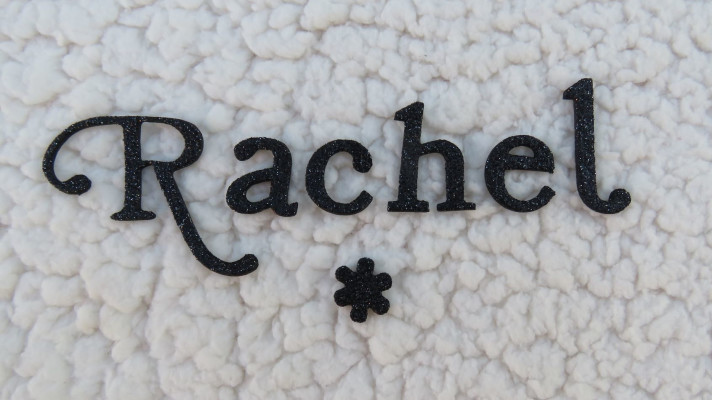Rahab
Bible Studies 28 Mar 2020
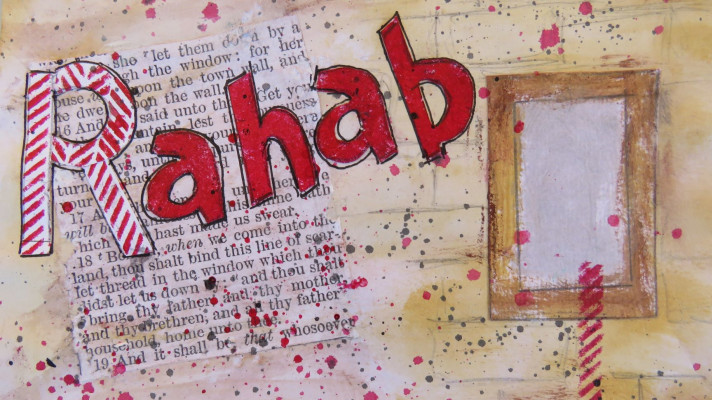
Women Of The Bible
Study 11
Rahab
Read – Joshua 2:1
*The large, strongly fortified city of Jericho was one of the most imposing fortifications in the land of Canaan. It was the key to the whole country and the first obstacle to conquer for the Israelites. Jericho was also a place of excessive idol worship and what went on within the walls was vile and degrading. Joshua sent out 2 men to spy out the city of Jericho, to gather any information they could, that would assist them with the impending battle. The 2 men’s lives were at great peril. The city was on high alert as they were well aware of the Israelite encampment that lay not far from their walls. Often families ran hotels/lodgings in the walls that surrounded the cities for travellers to stay. It was at one of these establishments that the spies found refuge
“God’s Israel, for aught that appears, had but one friend, but one well-wisher in all Jericho, and that was Rahab a harlot. God has often served his own purposes and his church’s interests by men of different morals. Had these scouts gone to any other house than this they would certainly have been betrayed and put to death without mercy. But God knew where they had a friend that would be true to them, though they did not, and directed them thither. Thus that which seems to us most contingent and accidental is often over-ruled by the divine providence to serve its great ends.” Matthew Henry – Joshua 2:1
Read – Joshua 2:2-7
“By these stalks of flax, which she herself had lain in order upon the roof to dry in the sun, in order to the beating of it and making it ready for the wheel, it appears she had one of the good characters of the virtuous woman, however in others of them she might be deficient, that she sought wool and flax, and wrought willingly with her hands, Prov. 31:13 . From this instance of her honest industry one would hope that, whatever she had been formerly, she was not now a harlot.” Matthew Henry – Joshua 2:2-7
Read – Joshua 2:8-13
*The verses that we have just read are some of the most amazing faith verses in the Bible. Rahab and her family it seemed offered accommodation in the wall of the city. Verse 1 refers to Rahab as a harlot. Whether the type of job she had automatically labelled her as that, or perhaps her family had given her more than once to guests for their comfort and pleasure. We hope as the quote above tells us that this was something she had done in the past, as the flax on the roof indicated that perhaps she was earning some extra money in other ways. With providing accommodation in the city’s’ walls, Rahab would have heard of all of the news of the surrounding nations, as visitors travelling through, would have passed on information to them. The Hebrews wanderings had not gone unnoticed – they would have heard of the amazing things that God had done on their behalf. Something had stirred in Rahab’s heart, and amongst all the idol worship that she was surrounded with, she recognised that God was the One and Only true God. She told the spies that her and her fellow Canaanites were terrified of them! In faith, she asked the spies for protection for her and her family when they take the city, in exchange for her taking care of the spies at great personal risk.
Read – Joshua 2:14-21
* The spies and Rahab come to an arrangement that on the promise of Rahab keeping their visit a secret, they will save her and her family, but she must place a scarlet cord in her window, and they must all stay inside the home no matter what.
Read – Joshua 2:22-24 & James 2:25
*Rahab saved the spies lives by directing them to a place to hide for 3 days. Her testimony of faith was then carried back to the Israelite encampment which gave them the strength and encouragement to move forward.
Read – Joshua 6:16-22 & Hebrews 11:30-31
* In the great faith chapter in Hebrews 11 Rahab is mentioned! This is an amazing witness to her faith.
Read – Joshua 6:23-25 & Matthew 1:1-6
*Rahab and her family were rescued from the city of Jericho because of Rahab’s courage in hiding the spies. The genealogy in Matthew tells us that Rahab was the great, great, grandmother of King David!
The story of Rahab is an amazing story of God’s grace for His wandering children. God accepted Rahab into His family – in the line for Jesus to come! She was not of Hebrew descent. She was a heathen Canaanite – immersed in idol worship. But Rahab’s heart was stirred. She had heard of the wonderful things God had done for the Hebrew nation. She could see that what was going on in her own life, was not satisfying her soul. She wanted something better, and by faith, she turned her back on her past old life, and reached out in faith for the One and Only true God. This experience is available to everyone! When you study the story of Rahab and her amazing faith how has it impacted your faith? It’s something to think about!
Power Text – John 20:29
“Jesus said to him, “Thomas, because you have seen Me, you have believed. Blessed are those who have not seen and yet have believed.”
What is the healthiest diet?
Health 01 Feb 2020

Find out what the latest science is saying about your favourite foods to help you make the healthiest choices for you and your family.
Dr Michael Gregor in his book How Not to Die, centres his recommendations around a Daily Dozen checklist of all the things I try to fit into my daily routine.
Daily Dozen Foods : Beans (Legumes), Berries, Other Fruits, Flaxseeds, Nuts, Spices, Cruciferous vegetables such as broccoli, Leafy greens (especially dark varieties), Other vegetables, Whole Grains, Beverages (particularly water), Exercise.
Dr Greger’s Daily Dozen is based upon the best available evidence for improving the nutrient density of your meals. It is not a meal plan or a diet, but a check list to guide us in selecting the healthiest of healthy foods to form our diet. It is designed to be an aspirational minimum for the average person. Athletes, growing adolescents, pregnant and nursing women may need to add more foods to their daily dozen. Check out NutritionFacts.org for a video on the “Daily Dozen Checklist”
Download this app called "Dr. Greger's Daily Dozen" for free on iPhone and for Android phones
For more details visit Evidence-Based Eating Guide
Daily Dozen Foods
Health 25 Jan 2020 Avondale Memorial Church

Beans (legumes), berries, other fruits, flaxseeds, nuts, spices, cruciferous vegetables such as broccoli, leafy greens (especially dark varieties), other vegetables, whole grains, beverages (particularly water), exercise.
Berries – the second item of the daily dozen Berries, including cherries and dark grapes are regarded as the healthiest of fruits. It is the antioxidants that give berries their colour. They offer nearly 10 times more antioxidants than other fruits and vegetables and exceed 50 times more than animal-based foods. These antioxidants offer potential protection against cancer, boost the immune system decrease the risk of developing cardiovascular disease and defend our brains and liver against damage caused by free radicals.
A study undertaken by Harvard University of 16,000 women found that women who consumed at least one serving of blueberries and two serving of strawberries each week had slower rates of cognitive decline by as much as two and a half years compared with those who didn’t eat any. Studies indicate that eating a handful of berries a day will help reduce the risk of our brains aging by at least 2 years.
Zipporah
Bible Studies 09 Oct 2019
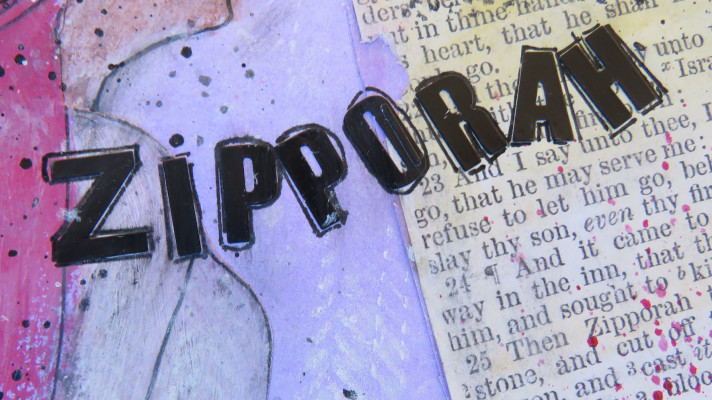
Women Of The Bible
STUDY 10
Zipporah
Read – Exodus 2:15-20
*It’s here we are introduced to Zipporah. Zipporah was the daughter of Reuel or Jethro as he was also known, who was described as a prince or a priest of Midian. The Midianites came from the descendants of Abrahams children from his second wife Keturah. They had retained the worship of the true God. Zipporah was one of Jethro’s seven daughters. The Bible does not mention Zipporah’s mother.
Read – Exodus 2:21-22
*After some time had passed Jethro gave Zipporah to Moses to be his wife. Verse 22 tells us they had a son named Gershom.
Read – Exodus 4:18-20
*Moses had been in Midian for 40 years when he was given instructions from God to go back to Egypt. Notice in verse 18 that he asked his father in laws’ permission to take his wife and sons with him. Jethro had been kind to Moses all those years before and given him refuge and here Moses is returning the courtesy. By this time, they had a second son named Eliezer.
Read – Exodus 4:24-26
“On the way from Midian, Moses received a startling and terrible warning of the Lord’s displeasure. An angel appeared to him in a threatening manner, as if he would immediately destroy him. No explanation was given; but Moses remembered that he had disregarded one of God’s requirements; yielding to the persuasion of his wife, he had neglected to perform the rite of circumcision upon their youngest son. He had failed to comply with the condition by which his child could be entitled to the blessings of God’s covenant with Israel; and such a neglect on the part of their chosen leader could not but lessen the force of the divine precepts upon the people. Zipporah, fearing that her husband would be slain, performed the rite herself, and the angel then permitted Moses to pursue his journey.” Patriarchs and Prophets, E.G. White, p255-256
*There must have been some discussion between Zipporah and Moses over the decision to not circumcise their second son. But when they had this experience with the angel, Zipporah knew exactly what she had to do. You can almost sense her shock of the event in what she says in verses 25 and 26. It was after this event that Moses thought it would be safer for Zipporah and their sons to return to her father.
Read – Exodus18:1-8
*The news of the exodus spread far and wide and Jethro upon hearing the news set out to meet and to restore to Moses his wife Zipporah and their sons. This must have been a joyous occasion. The Bible does not indicate the length of time that Moses and Zipporah were apart but there was much rejoicing and celebration when they came together. Read verses 9-12
Read – Numbers 12:1-2
“Zipporah was treated with ill-disguised contempt. Though called a “Cushite woman, the wife of Moses was a Midianite, and thus a descendant of Abraham. In personal appearance she differed from the Hebrews in being of a somewhat darker complexion. Though not an Israelite, Zipporah was a worshiper of the true God. She was of a timid, retiring disposition, gentle and affectionate, and greatly distressed at the sight of suffering; and it was for this reason that Moses, when on the way to Egypt, had consented to her return to Midian. He desired to spare her the pain of witnessing the judgments that were to fall on the Egyptians. When Zipporah rejoined her husband in the wilderness, she saw that his burdens were wearing away his strength, and she made known her fears to Jethro, who suggested measures for his relief. Here was the chief reason for Miriam’s antipathy to Zipporah. Smarting under the supposed neglect shown to herself and Aaron, she regarded the wife of Moses as the cause, concluding that her influence had prevented him from taking them into his counsels as formerly.” Patriarchs and Prophets, E.G. White, p383-384
*The reason for Miriam’s jealousy goes back to Exodus 18:13-27 when Jethro advised his son in law in how to managed the Israelites without consulting Aaron or Miriam. Miriam directed her dissatisfaction of this event towards Zipporah and treated her with disdain. We discussed the outcome of this in our last devotional. God was not pleased with how Zipporah was treated.
When you think about it, Zipporah’s only point of reference as wife to Moses was being a wife of a shepherd during the 40 years he dwelt in Midian. Before that he was prince and leader in the royal Egyptian court. When Zipporah was reunited with him at Sinai, he had just led over a million people out of Egypt and had experienced the mighty hand of God. Zipporah must have wondered at times who she was married to as Moses roles in life changed so dramatically. It must have been no easy task for her to assimilate into the Israelite community as a Midianite even though she believed in the same God. Zipporah in the end had to be adaptable, which would have brought many challenges. What can you take from Zipporah’s story and apply to your own life?
Power Text – Psalm 27:3
“Though an army may encamp against me, my heart shall not fear; Though war may rise against me, in this I will be confident”.
Miriam
Bible Studies 12 Jul 2019
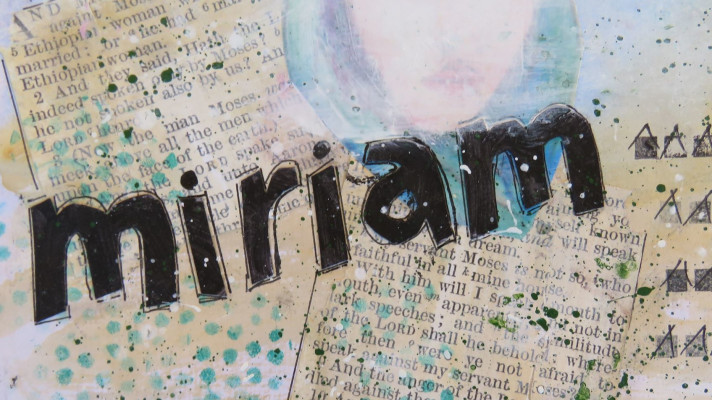
Women Of The Bible
STUDY 9
Miriam
Read – Numbers 26:59
*It’s here we are introduced to Miriam. Miriam was the daughter of Jochebed and Amram and the sister to Aaron and Moses.
Read – Exodus 2:1-3
*These verses tell us the background story of Miriam’s family. Jochebed and Amran were slaves who lived in Egypt. After the birth of Aaron and Miriam the king of Egypt decided to make a new decree that all baby boys born to the Hebrew slaves were to be thrown into the river Nile. The king felt threatened by their rapid population growth. Jochebed as we found out in the previous study had great faith and was determined that this was not going to be the fate of her 3rd newly born child.
Read – Exodus 2:4-8
“ Miriam’s force of character had been early displayed when as a child she watched beside the Nile the little basket in which was hidden the infant Moses. Her self-control and tact God had made instrumental in preserving the deliverer of His people.” Patriarchs and Prophets, E.G. White, p382
*We do not know how old Miriam was when she watched over her baby brother, but her bravery in approaching the Pharaoh’s daughter was remarkable. The above quote gives us an amazing insight into her character.
Read – Exodus 15:20-21 and Micah 6:4
“Aaron and Miriam had occupied a position of high honor and leadership in Israel. Both were endowed with the prophetic gift, and both had been divinely associated with Moses in the deliverance of the Hebrews…Richly endowed with the gifts of poetry and music, Miriam had led the women of Israel in song and dance on the shore of the Red Sea. In the affections of the people and the honor of Heaven she stood second only to Moses and Aaron.” Patriarchs and Prophets, E.G. White, p382
* Considering the lot of women at the time Miriam was blessed by God to hold such an honoured position of leadership.
Read – Numbers 12:1-10
“In the appointment of the seventy elders Miriam and Aaron had not been consulted, and their jealousy was excited against Moses. At the time of Jethro’s visit, while the Israelites were on the way to Sinai, the ready acceptance by Moses of the counsel of his father-in-law had aroused in Aaron and Miriam a fear that his influence with the great leader exceeded theirs. In the organization of the council of elders they felt that their position and authority had been ignored. Miriam and Aaron had never known the weight of care and responsibility which had rested upon Moses; yet because they had been chosen to aid him they regarded themselves as sharing equally with him the burden of leadership, and they regarded the appointment of further assistants as uncalled for… Yielding to the spirit of dissatisfaction, Miriam found cause of complaint in events that God had especially overruled. The marriage of Moses had been displeasing to her. That he should choose a woman of another nation, instead of taking a wife from among the Hebrews, was an offense to her family and national pride.” Patriarchs and Prophets, E.G. White, p382-383
*What can we learn from this episode of Miriam’s life? Here was a woman, highly honoured by God smitten down by leprosy. How quickly her circumstances changed. Could we make the same mistake?
Read – Numbers 12:11-16
*It was envy and jealousy that got Miriam into this trouble. Because of Miriam’s position it was something that God could not leave unaddressed. Aaron and Miriam were humbled and repented. God in His mercy and grace healed Miriam but she had to remain outside of the camp for 7 days. Even though Miriam had done wrong, because of her high and honoured position, the Israelite camp mourned and waited for the 7 days to be over before they moved on. This showed the respect the Israelite’s had for her.
Read – Numbers 20:1
*It’s interesting that after the leprosy incident that we hear no more of Miriam until her death.
The Bible does not indicate if Miriam married or had any children. We can just conclude that she remained single and was devoted to the role that God gave her. For her to be given this position her faith and devotion for God must have been extraordinary. Is there anything we can take away from Miriam’s story and apply to own Christian walk?
Power Text – 2 Samuel 22:2-4
“The Lord is my rock and my fortress and my deliverer; The God of my strength, in whom I will trust; My shield and the horn of my salvation, My stronghold and my refuge; My Savior, You save me from violence. I will call upon the Lord, who is worthy to be praised; So shall I be saved from my enemies.”.
Jochebed And The Pharaoh’s Daughter
25 Jun 2019
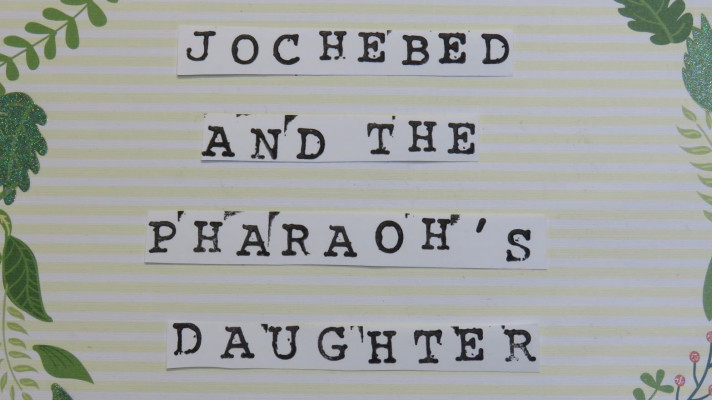
Women Of The Bible
STUDY 8
Jochebed And The Pharaoh’s Daughter
Background: Read – Exodus 1:7-22
*Think about those brave midwives and the risks they took to keep the baby boys alive. Verses 20-21 tell us that God blessed them for their bravery and faithfulness.
Read - Exodus 2:1, Exodus 6:20 & Numbers 26:59
*The Bible tells us that Amran actually married his Aunt. Jochebed must have been a much younger sister of his father. Intermarriage was a normal occurrence at this time.
Read – Exodus 2:2, Acts 7:20 & Hebrews 11:23
“While this decree was in full force a son was born to Amram and Jochebed, devout Israelites of the tribe of Levi. The babe was “a goodly child;” and the parents, believing that the time of Israel’s release was drawing near, and that God would raise up a deliverer for His people, determined that their little one should not be sacrificed. Faith in God strengthened their hearts, “and they were not afraid of the king’s commandment.” Patriarchs and Prophets, E.G. White, P242-243
Read – Exodus 2:3-6
“The mother’s earnest prayers had committed her child to the care of God; and angels, unseen, hovered above his lowly resting place. Angels directed Pharaoh’s daughter thither. Her curiosity was excited by the little basket, and as she looked upon the beautiful child within, she read the story at a glance. The tears of the babe awakened her compassion, and her sympathies went out to the unknown mother who had resorted to this means to preserve the life of her precious little one. She determined that he should be saved; she would adopt him as her own.” Patriarchs and Prophets, E.G. White, P243
*It’s ironic that the Pharaoh wanted to kill all the Hebrew baby boys but here is his own daughter saving one! God is so good and He always finds a way, often in ways we don’t even think of. Just like Moses parents saw something special in Moses so did the Pharaoh’s daughter when she looked upon Moses face. God chose the Pharaoh’s daughter to save His leader and Prophet who was to do a great work for Israel.
Read - Exodus 2:7-9
*What an incredible answer to prayer. God honoured Jochebed’s faithfulness and allowed her to take care of her own son. Jochebed was a humble slave living in extremely difficult times. Jochebed knew she had only a limited time with her son to teach him about the love, mercy and faithfulness of God. Jochebed knew that when it came time for Moses to go and live in the Palace, God would not be worshipped there.
Read – Exodus 2:10
“She kept the boy as long as she could, but was obliged to give him up when he was about twelve years old. From his humble cabin home he was taken to the royal palace, to the daughter of Pharaoh, “and he became her son.” Yet even here he did not lose the impressions received in childhood. The lessons learned at his mother’s side could not be forgotten. They were a shield from the pride, the infidelity, and the vice that flourished amid the splendour of the court… The whole future life of Moses, the great mission which he fulfilled as the leader of Israel, testifies to the importance of the work of the Christian mother. There is no other work that can equal this.” Patriarchs and Prophets, E.G. White, P244
Read – Hebrews 11:24-29
Here is the fruit of Jochebed’s faithfulness. Take a moment to think about the faith of Jochebed. She gave up her son twice! Once as a baby to the fate of the river Nile and the second time to the Pharaoh’s daughter to live in the palace. Put yourself in her shoes – could you do the same? It’s a challenging thought. What can we learn from the life of Jochebed?
Power Text – Mark 11:22-24
“So Jesus answered and said to them, “Have faith in God. For assuredly, I say to you, whoever says to this mountain, ‘Be removed and be cast into the sea,’ and does not doubt in his heart, but believes that those things he says will be done, he will have whatever he says. Therefore I say to you, whatever things you ask when you pray, believe that you receive them, and you will have them.”.
Tamar
Bible Studies 22 May 2019

Women Of The Bible
STUDY 7
Tamar
Read - Genesis 38:1-6
*Here we read that Judah, one of Jacob’s 12 sons, leaves his Hebrew/Israelite family community to marry a Canaanite woman. They had 3 sons together and it’s here that we are introduced to Tamar. Tamar was chosen to marry Judah’s oldest son Er.
Read – Genesis 38:7-8 and Deuteronomy 25:5-10
*So, Er died and Tamar was given to her brother in law to marry as per Deuteronomy 25:5.
Read – Genesis 38:9-11
*The whole reason Tamar had to marry Onan was to carry on her first husbands name. Onan refused to comply with this and he also died. Tamar is now twice widowed by no fault of her own. Her father in law reluctant to give her his third son sends Tamar back to her family telling her, Shelah was not old enough yet. Judah also charged her to remain a widow. Being sent back to her family would have created a stigma for Tamar. By law she was considered Shelah’s wife but she was a wife with no husband. Her future at this point did not look positive.
Read – Genesis 38:12-15
“Tamar wickedly prostituted herself as a harlot to Judah, that, if the son might not, the father might raise up seed to the deceased. Some excuse this by suggesting that, though she was a Canaanite, yet she had embraced the true religion, and believed the promise made to Abraham and his seed, particularly that of the Messiah, who was to descend from the loins of Judah, and that she was therefore thus earnestly desirous to have a child by one of that family that she might have the honour, or at least stand fair for the honour, of being the mother of the Messiah. And, if this was indeed her desire, it had its success; she is one of the four women particularly named in the genealogy of Christ. Her sinful practice was pardoned, and her good intention was accepted, which magnifies the grace of God, but can by no means be admitted to justify or encourage the like.” Matthew Henry Commentary Gen 38:12
Read – Genesis 38:16-19
*Here Judah is ignorantly committing incest with his daughter – in -law. Tamar was desperate to have her status reinstated and was willing to do what she did. If Judah had been faithful to the law and allowed Tamar to have his son Shelah perhaps this would not have happened.
Read – Genesis 38:20-23
*Judah had given away his identity as a pledge to Tamar or (harlot as Judah thought she was), for payment for her services. Judah tried to redeem his articles with a kid goat from his flock, but of course, they could not find her. Judah is then left without his staff, signet and bracelets that identify him. His identity was now in the hands of a harlot, who we know of course to be Tamar.
Read – Genesis 38:24
*It’s interesting that Judah was so quick to judge and condemn Tamar yet he himself was not leading a life that was fitting for a spiritual Israelite leader. Judah was next in line for the birthright from his father Jacob.
“Judah’s rigour against Tamar, when he heard she was an adulteress. She was, in the eye of the law, Shelah’s wife, and therefore her being with child by another was looked upon as an injury and reproach to Judah’s family: Bring her forth therefore, says Judah, the master of the family, and let her be burnt; not burnt to death, but burnt in the cheek or forehead, stigmatized for a harlot.” Matthew Henry Commentary Gen 38:24
Read – Genesis 38:25-26
*Judah admitted that he had wronged Tamar by withholding his 3rd son from her. The Bible tells us that they did not have any more intimate relations.
Read – Genesis 38:27-30
*Here the Bible tells us that Tamar had twin boys named Perez and Zerah.
Read Ruth 4:12, 18-22 and Matthew 1:1-3
A Woman’s life was hard and complex during this time as a woman’s survival and status was totally dependent on the male figures in her life. Tamar was not an Israelite yet she happened to get caught up with an Israelite/Canaanite blended family through marriage. Her life was complicated by being widowed twice and her rightful 3rd husband not given to her. Our study of Tamar is an amazing study of God’s grace as Tamar’s status in the family was eventually secured and restored through the birth of her twin boys which came through rather unconventional means. But through all of this her son Perez became part of the genealogy of Jesus Christ. How has the story of Tamar changed your view on the grace of God?
Power Text – Nehemiah 9:31
“..For thou art a gracious and merciful God”.

